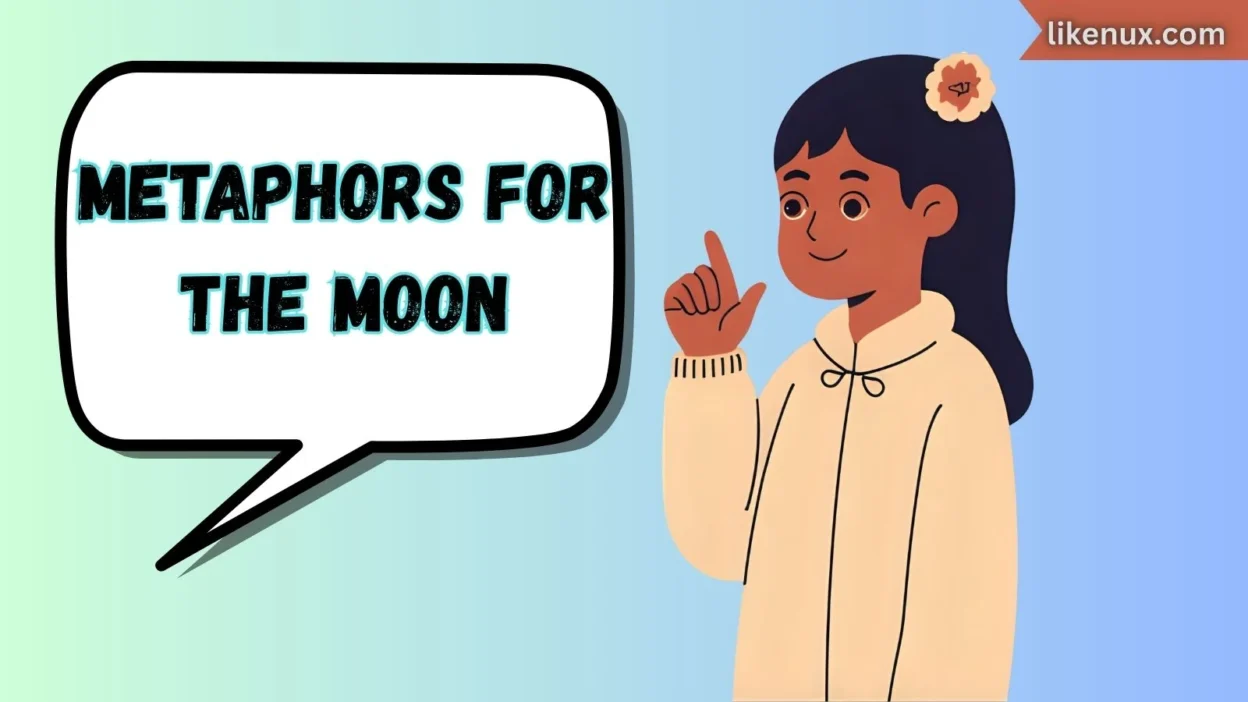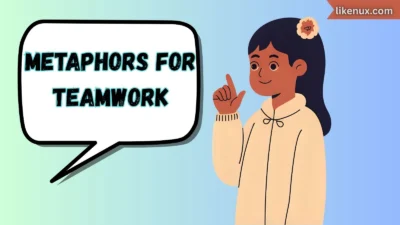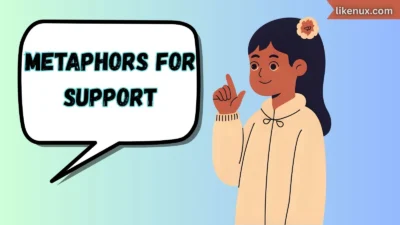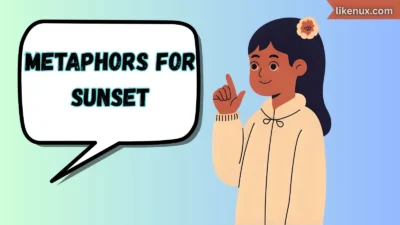The moon has always been a symbol of mystery, beauty, and inspiration. For centuries, poets, writers, and dreamers have used metaphors for the moon to express love, longing, and wonder. In this article, we’ll explore 25 unique metaphors for the moon, each explained in a simple, meaningful, and heartfelt way. Metaphors for the Moon.
These metaphors are perfect for adding warmth, depth, and creativity to your conversations, poetry, or personal reflections.
1. The Silent Guardian
Meaning: The moon watches over the world without making a sound.
In a sentence: “The moon hung high, a silent guardian of the sleeping earth.”
Best use: Expressing protection, peace, and quiet observation.
Other ways to say: The night’s watchman, quiet sentinel.
Read More: Metaphors for Time
2. The Silver Lantern
Meaning: The moon lights up the night like a lantern.
In a sentence: “The silver lantern guided us through the dark forest.”
Best use: Perfect for describing brightness in darkness.
Other ways to say: Night torch, celestial lamp.
3. The Timeless Mirror
Meaning: Reflects light, time, and emotions endlessly.
In a sentence: “The timeless mirror reflected the sun’s farewell glow.”
Best use: For evoking nostalgia and reflection.
Other ways to say: Eternal reflector, ageless glass.
4. The Lover’s Beacon
Meaning: A guiding light for those in love.
In a sentence: “Under the lover’s beacon, they shared their first kiss.”
Best use: Romantic settings and intimate moments.
Other ways to say: Passion’s guide, heart’s light.
5. The Gentle Healer
Meaning: Brings calmness and emotional healing.
In a sentence: “Her tears eased under the gentle healer above.”
Best use: For comfort and soothing expressions.
Other ways to say: Night comforter, soul soother.
6. The Celestial Pearl
Meaning: Precious and rare in the night sky.
In a sentence: “The celestial pearl shimmered on the horizon.”
Best use: Highlighting rarity and beauty.
Other ways to say: Sky gem, heaven’s jewel.
7. The Eternal Witness
Meaning: The moon sees everything through time.
In a sentence: “The eternal witness has watched empires rise and fall.”
Best use: For history, memories, and time’s passage.
Other ways to say: Timeless observer, constant watcher.
8. The Dream Weaver
Meaning: Inspires dreams and imagination.
In a sentence: “The dream weaver spun tales in her sleep.”
Best use: Creative writing, fantasy themes.
Other ways to say: Night muse, slumber’s artist.
9. The Whispering Companion
Meaning: Feels like a quiet friend in solitude.
In a sentence: “He spoke to the whispering companion in the sky.”
Best use: For loneliness or self-reflection.
Other ways to say: Silent friend, comforting presence.
10. The Night’s Crown
Meaning: Reigns over the evening sky.
In a sentence: “The night’s crown sparkled above the darkened land.”
Best use: Describing majesty and importance.
Other ways to say: Sky ruler, evening queen.
11. The Celestial Clock
Meaning: Marks time and tides.
In a sentence: “The celestial clock signaled another sleepless night.”
Best use: For cycles, changes, and natural rhythms.
Other ways to say: Lunar timer, heavenly cycle.
12. The Forgotten Sun
Meaning: A softer version of sunlight.
In a sentence: “The forgotten sun glowed gently above.”
Best use: For contrast between day and night.
Other ways to say: Night sun, subdued light.
13. The Mystic Eye
Meaning: A mysterious eye gazing from the heavens.
In a sentence: “The mystic eye watched their every move.”
Best use: For mystery, magic, and fate.
Other ways to say: Sky’s eye, enchanted gaze.
14. The Shadow Dancer
Meaning: Plays with darkness and light.
In a sentence: “The shadow dancer moved behind drifting clouds.”
Best use: Artistic and vivid imagery.
Other ways to say: Cloud’s partner, light twirler.
15. The Ocean’s Partner
Meaning: Influences the tides and waves.
In a sentence: “The ocean’s partner pulled the waves closer.”
Best use: For nature, science, and romance.
Other ways to say: Tide caller, sea’s companion.
16. The Poet’s Muse
Meaning: Inspires art, poetry, and songs.
In a sentence: “The poet’s muse rose over the horizon.”
Best use: Artistic works and emotions.
Other ways to say: Creative light, muse of night.
17. The Night’s Candle
Meaning: Burns softly in the darkness.
In a sentence: “The night’s candle flickered above the valley.”
Best use: Gentle and warm depictions.
Other ways to say: Evening flame, night taper.
18. The Solitary Jewel
Meaning: Stands alone, yet magnificent.
In a sentence: “The solitary jewel shone against a black canvas.”
Best use: Emphasizing solitude and beauty.
Other ways to say: Lone gem, isolated treasure.
19. The Celestial Traveler
Meaning: Moves across the sky each night.
In a sentence: “The celestial traveler drifted beyond the mountains.”
Best use: For journeys, time, and change.
Other ways to say: Sky wanderer, star companion.
20. The Hidden Lover
Meaning: Sometimes veiled by clouds, like a shy lover.
In a sentence: “The hidden lover teased behind silver curtains.”
Best use: Romantic and secretive moods.
Other ways to say: Shy light, veiled beauty.
21. The Earth’s Twin
Meaning: Constantly paired with Earth.
In a sentence: “The earth’s twin hovered gracefully above.”
Best use: For closeness and companionship.
Other ways to say: Sky sibling, planet’s partner.
22. The Cosmic Storyteller
Meaning: Holds countless tales in its glow.
In a sentence: “The cosmic storyteller shared secrets with the stars.”
Best use: For mythology and inspiration.
Other ways to say: Celestial narrator, myth bearer.
23. The Velvet Pearl
Meaning: Soft and glowing like silk and pearls.
In a sentence: “The velvet pearl adorned the night.”
Best use: Gentle and luxurious imagery.
Other ways to say: Satin gem, moon jewel.
24. The Forgotten Witness
Meaning: Overlooks unnoticed moments in history.
In a sentence: “The forgotten witness watched as the world slept.”
Best use: For deep, reflective contexts.
Other ways to say: Overlooked guardian, silent observer.
25. The Light of Longing
Meaning: Symbolizes desire and yearning.
In a sentence: “She reached for the light of longing in the sky.”
Best use: Expressing emotional depth and desire.
Other ways to say: Love’s glow, distant hope.
FAQs
1. Why are metaphors for the moon so popular?
They capture emotions, beauty, and mystery in a way that resonates universally.
2. Can I use these metaphors in daily conversation?
Absolutely! They can make your words more vivid and heartfelt.
3. Are these metaphors suitable for poetry?
Yes, they are perfect for creative writing, poetry, and storytelling.
4. How do metaphors improve emotional expression?
They create imagery that connects deeper with feelings and imagination.
5. Can I adapt these metaphors for other celestial objects?
Yes, many of them can be tailored for stars, sun, or planets.
Conclusion
The moon is more than just a celestial body—it’s a symbol of love, mystery, and inspiration. Using these 25 metaphors for the moon, you can add beauty, depth, and emotion to your words, whether in writing, speaking, or personal reflection. Let the moon’s timeless glow guide your expressions and inspire your own unique metaphors.

David Robert is a passionate innovator driven by creativity, vision, and purpose. He turns bold ideas into impactful realities through focus, leadership, and dedication.



